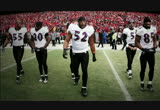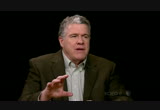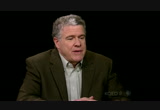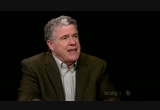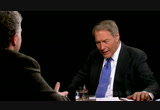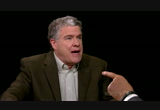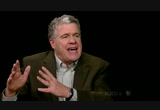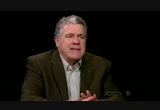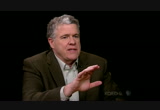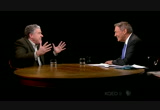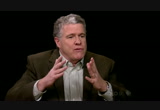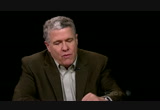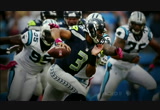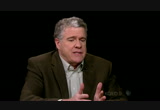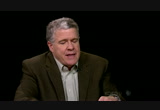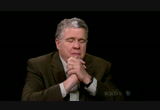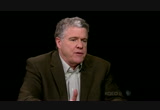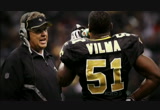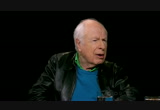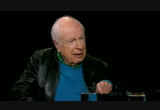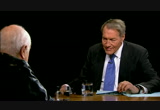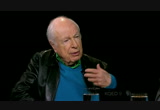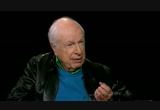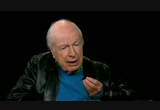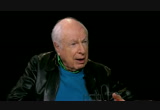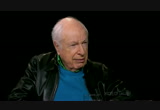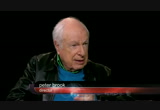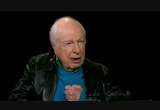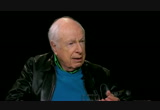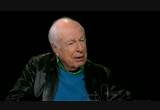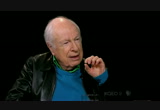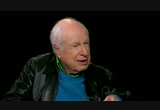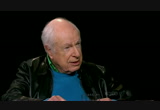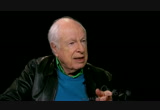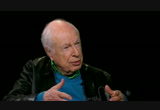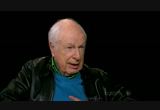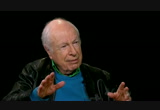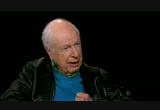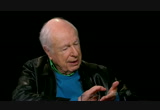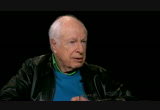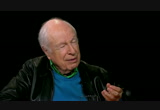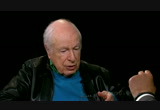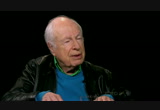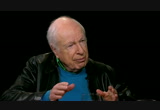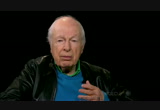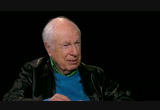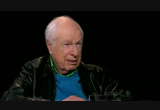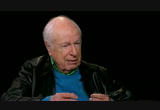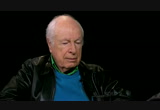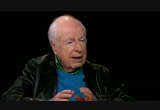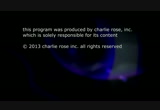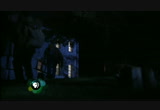tv Charlie Rose PBS January 29, 2013 12:00am-1:00am PST
12:00 am
captioning sponsored by rose communications from our studios in new york city, this is charlie rose. >> rose: the 47th super bowl will kick off on sunday, february 3, at the superdome in new orleans. the a.f.c. champion baltimore ravens will meet the n.f.c. champion san francisco 49ers in a game filled with intrigue. it's what's being called the har-bowl. it's the first time brothers will face each other from a opposing sidelines. the game also marks the end of one of the n.f.l.'s great careers with the retirement of ravens' linebacker ray lewis. joining me, peter king of "sports illustrated," widely regarded as america's premier n.f.l. writer. his column "monday morning quarterback" has become a must read for n.f.l. fans since it
12:01 am
began 15 years ago. i'm pleased to have him back at this table. welcome back. >> thank you, charlie. appreciate it. >> rose: set up this game for me. you have said that the ravens should have the upper hand because they're on a roll and you beat peyton manning and tom brady, you deserve a certain amount of respect. >> well, if you go through your playoff run, after having a mediocre end to the year losing four of your last five and you come into the playoffs and you beat the young wonder kind, andrew luck, then you beat peyton manning and tom brady on the road and your defense-- which was suspect the whole year-- allows 14 points a a game in those three games then you start to say, you know, there's something going on here. and you start to look at them and say this is really not the ravens team that they appeared to be in december. but then 49ers come in and
12:02 am
they've got this young stallion of a quarter back who runs as well as he throws and how about this? he runs for 181 yards in one playoff game against green bay then in the next playoff game he only runs one time on purpose for minus two yards. and so -- and he beats the atlanta falcons in the championship game with his arms, not his legs. so you're the ravens and you say what are we going to see kaepernick the runner? kaepernick the passer? some sort of hybrid guy who who's between? that's why there's so many interesting storylines in this game revolving not just around the people but the strategy. >> rose: there's also the story of both quarter backs, not only caber nick but flacco. >> rose: >> joe flacco is an amazing story from the standpoint that no one has ever called him a premier quarterback since the day he walked into the n.f.l. a
12:03 am
half decade ago. he's got more wins than any quarter back in football. and so you say how has this happened? he's got a great support system and he's had a good defense and he has a good runningback in ray rice. but, charlie, i've covered this guy a lot over the last five years and i'm convinced that one of the things that makes him so good is that he just doesn't care. i walked off the field with him in denver after he had this thrilling, scintillating, incredible double overtime win over the denver broncos and i seidl up next to him and he goes "hi peter." just like a normal day. and he stops to sign an autograph for a ravens kid, to sign his jersey. and his dad says to flacco "i guess you proved skip baylis wrong today." and scape baylis being a big announcer for espn who had been
12:04 am
ripping flacco and all of a sudden -- joe either had no idea who skip baylis was or just didn't care. and it might have been both because he doesn't care what the outside world things. >> rose: but he can throw deeper than anybody in the league ( >>? minute, yeah. the stats say he can. he threw for 1,500 yards purely on deep balls alone and i just think he's never going to be the pretty boy quarterback because he doesn't care. when you throw the ball down field all the time you'll throw a lot of incomplete passes. but his story is so good. charlie, here's a guy that couldn't start at the university of pittsburgh so he had to transfer to delaware. >> rose: so he could play! >> so he could play. quarterbacks in this game from r from delaware and nevada. >> rose: (laughs) >> the football hotbeds of the n.c.a.a. but i like flacco a lot just
12:05 am
from the standpoint that i love when guys don't care what geniuses like me say and what the announcers say and everything like that. they don't care, they don't listen, they don't pay attention. they're just out there playing. >> rose: the pass that got them to the playoff -- i mean got them to the extra period, was that a hail mary or not? >> no, it was not a hail mary, it was a design play and, you know, what was great about the pass itself is that all flacco wanted to do was to see his guy one step behind any of the cornerbacks. because they had four -- it was called four vertical which is means you got four guys just running deep. so as soon as he saw any one of his guys -- >> rose: he's going to throw to that guy. >> he's going to throw to that guy. and when he threw this ball, the great thing about the throw is that vaughan miller of the denver broncos was lunging at him.
12:06 am
so instead of throwing it normally, he had to throw it like a rainbow. and he threw it -- it was so high it was almost like a punt and he threw it so high and his guy caught the ball and scampered in for the touchdown and really to me one of the great moments in n.f.l. playoff history because of how ridiculously unlikely it was. >> rose: how do you explain the complete shutdown -- the complete failure of a secondary at a moment like that? >> you know, i think -- >> rose: not once, not twice but several times. >> i think i explain it by the fact that you've got a couple inexperienced players for denver in the secondary, one of which was going to try to gamble and get an interception, you know? moore, a safety for denver, and so he -- you know, he wanted to stay up to make sure that if flacco was going to throw the ball in the intermediate part of the field he would lie in wait and try to intercept the ball instead of being the deep center
12:07 am
fielder, which he should have been. unfortunately now he'll be known for that is the rest of his career. >> rose: the other point you made is john harbaugh changed the team during mid-season. he took the defense apart. >> you know, it's amazing to me. coaches a lot of times -- i remember, there was three weeks left in the regular season when john harbaugh chose to fire his offensive coordinator cam cameron and replace him with jim caldwell. and what is amazing to me is that cameron had been there for five years and a lot of coachs if they see a dysfunctional situation for whatever reason will just say "okay. we'll change this in the off season. it's too embarrassing to change it now." >> rose: not harbaugh. >> both of these harbaughs did something late in the year that appeared to be stupid. one changed quarter backs and,
12:08 am
you know, jim harbaugh chains quarterbacks from the highest rated passer in the n.f.l. to an unproven guy, this colin kaepernick, this stallion that we're talking about and the other one change to the offensive coordinator with three weeks left. that was a little bit more understandable because a lot of the players had been chafing at the offense that they had been running but be that as it may both of them have been risky moves that paid off. >> and there's the narrative of raye louis. >> ray lewis obviously 36-year-old linebacker for the ravens. you know, the first day that the baltimore ravens really existed that anybody started to get to know them was on draft day in 1996. long-time football fans will remember that the cleveland browns left cleveland. art modell moves them to baltimore. so the first real big thing they did was have a draft.
12:09 am
and in the first round that day, the first round of that draft they picked ray lewis. it's amazing. that was 1996 and he's still playing here it is 2013. at the most rough-and-tumble position there is, middle linebacker, you get careened around and you get hit, stomped, concussed. when the ravens called them to tell them that he had been drafted, the general manager called him and said "hey, raye, this is ozzie new? general manager in baltimore and we're getting ready to draft you, i wanted to let you know." because they hadn't been officially named yet. he said "well mr. newsom, can you tell me, are we going to have a nickname this year? what's our name?" that's how long ago ray lewis was drafted. they didn't have a nickname then >> so much for match, you have quarter back, coach, coach, you have offense, you have defense.
12:10 am
so far? >> yeah, i think the most interesting part of this game from a strategic sense is what a bunch of very smart veteran baltimore defensive players and a veteran defensive coordinator named dean pease who was with bill belichick for a long time. smart guys. ray lewis is extremely smart. ed reid, the safety, very smart. they've played together for almost a decade these guys on defense and they have to now confront this quarter back who basically runs the option. you know, they have to go back to the future. they have to go back to -- i'm sure ray lewis when he was at the university of miami played some option teams and for those who don't know it, the option is when the quarter back takes the ball and maybe hands off, maybe he rolls out, maybe he throws. but you don't know at the snap of the ball what he's going to
12:11 am
do and it's like the old wish bone offense where maybe he pitches, maybe he stops suddenly and throws. now this veteran team-- ray lewis' last game-- he'll have one of the biggest challenges by far of his life because he has no idea of the snap of the ball. run, pass, rollout, dive, whatever. so i think if you're watching this game at home watch how number 52 for the ravens. ray lewis adjusts his defense to this weird new way offense. because, charlie, one of the great untold stories right now is what's going to happen in offensive football with these quarterbacks. russell wilson of seattle. colin kaepernick. cam newton in carolina. all these guys are so much more than just pocket quarter backs. they do so many different things
12:12 am
and the strategy involved and the excitement involved. and so i just think -- i was saying to the inventor of one of these formations, it's a college coach nameñr chris alt who usedo coach colin kaepernick in nevada i said this is as exciting a time as i remember on the field since i've ever covered the n.f.l. because -- >> rose: a number of very good quarter backs who can do everything. >> who are playing the game differently. everybody always says oh, keep your quarter back in the pocket you don't want to get him hurt. but now everybody is saying well okay, i'm going to tell my quarterback at the first sign that he's going to get killed dive down, don't take the big hit. but all these guys, just watch, they don't take those huge hits but they get out in the open field and make things happen. look at russell wilson, he plays
12:13 am
like fran tarkenton used to. >> rose: compare the harbaugh brothers, john at the ravens, jim at the 49ers who came from stanford and had been a college coach. and harbaugh i think -- john, was-the-safety coach or something? >> he was the defensive back field coach and a special teams coach. special teams coach for the philadelphia eagles and he spent one year as a defensive back field coach because he wanted to be a head coach in the n.f.l., he was frustrated and wasn't getting an opportunity as a special teams coach. charlie, i think this is the story of a little engine that could guy, john harbaugh, who was never handed anything in his life and basically he had to work for every coaching opportunity he had. even though his dad was the head coach of western connecticut and so i mean he knew football, he was in the game. he was never handed anything.
12:14 am
he had to work for everything he got and i'm not saying jim didn't, but jim harbaugh was an outstanding college player, a first round draft choice in the n.f.l., a quarter back for mike ditka. a quarterback for a long time in the n.f.l. so he had the road paved for him a little bit better than john did. now, if you tell jim that he's a silver spoon guy he'll knock your teeth out! because he, too, worked his rear end off to get where he is today. and he is a really, really smart coach. and i think the one thing i like about both these guys is they refuse to do what everybody else does. they're fine in breaking the mold. they'll break the mold any way they think will help their team and that's one of the things -- i think these are two new coaches for the new n.f.l. they're both young, they're 50 and 48 i think.
12:15 am
and they have idea that i'm not going to do it the way my predecessors did it. i'm going to look at my team and see the best way for my team and i'll make a decision that might rankle people. if i'm jim harbaugh i might play this young quarterback from nevada and i might sit the guy who's the best quarter back in the n.f.l. in terms of statistics because i think this guy is going to give us something the other guy can't give us. and he's been proven right. >> rose: that has game become enormously complex? >> incredibly so. after the n.f.c. championship game i was talking to greg roman the offensive coordinator of the 49ers and one of the things he said is so much of our game plan so much of our thought process heading into this game-- and he could have been talking about any game-- is the element of
12:16 am
disguise and he wants to fool the other guy. he knows it's going to be a chess match. he wants to make sure on the other side of the field they're saying "what in the world are they doing?" and that's becoming more and more when you watch football every single week in the n.f.l. the reason why you see so many unexpected things in the regular season is because you have coaches on the other side playing spy versus spy. they're saying "if he thinks i'm going to do this, i'm going to do that. if the falcons think we're going to run colin kaepernick 16 times we'll run once. if the ravens think we're going to run colin kaepernick this time -- and if your player is talented enough to carry out whatever you want them to do you have a chance to look like a genius. >> rose: paily just got reinstated, coach of the new
12:17 am
orleans saints. tell me where -- i was down there and i talked to the commissioner about this and i talked to new orleans people about this. what do you make of it? >> well, i think sean peyton, the coach of the saints, believes that now that he probably should have had a little bit tighter leash on what his defensive staff was doing and what his defensive staff was doing was running a pretty large and pricey pay-for-performance system where hundreds and sometimes thousands of dollars could be won by players based on what they did in the course of a game based on good plays they made. >> rose: plays including taking out the guy? >> yeah, and again these are things that are really still up for some debate.
12:18 am
the n.f.l. claims to have incontrovertible proof that jonathan vilma the linebacker offered $10,000 to take brett favre and/or curt warner out of games in the 2009 season. and they claim to have two sworn affidavits from coaches on that staff saying jonathan vilma offered the money. i think what you're going to see charlie is i think you're going to see everybody go to radio silence on this because they realize that nothing can be gained to continuing to rehash this. roger goodell is not going to go to new orleans and try to make his point to the fans that, hey, we were right. he's just going to move on. and he'll be hated the new orleans the same way that until a lot of ways paul tagliabue was hated for letting the browns leave cleveland and things like that. but i think both sides realize there's very little to gain right now on continuing to press this and make it an issue.
12:19 am
>> rose: great to have you here. >> thank you, charlie. >> rose: peter king from "sports illustrated." back in a moment. stay with us. >> rose: peter brook is here, his work as a director has helped shape modern theater over the last 70 years. he grew famous by paring down shakespeare to its human essence. brooks experimental theater group has performed for royalty and he has lived in paris since 1970. now he's brought his latest work to the brooklyn academy of music. it's a play set in apartheid south africa called "the suit." here's a look. ♪ ♪ ♪ ♪
12:20 am
♪ it's a new dawn, it's a new day, it's a new life ♪ you know how i feel ♪ ♪ it's a new day, it's a new dawn, it's a new life for me ♪ >> rose: i'm pleased to have peter brook back. thank you for coming. it's great to see you. let me talk about a suit. >> rose: sure. >> you performed it in paris? >> originally. >> rose: what attracted to you to it? >> what attracted me to it was that we had a long, long working connection with africa on many levels and particularly with south africa and this story came out of a young black writer of enormous talent who was in the
12:21 am
end denied permission to have his works published. can you imagine a more cruel thing to do. so -- the two of us sitting here talking are denied the act of speaking. and he died very young from drink but on the way he produced one or two remarkable short stories and one of them "the suit" was about a relation that makes it universal between a man and a woman and that we're caught up with right away, husband and wife, it's everywhere, our story. and yet it has a strangeness unusual aspect which is what this story is about that could only have taken place in -- as we say under under the iron fist of approach of apartheid. people that that if people live ordinary lives there but they
12:22 am
live within a pressure cooker that distorted one of their ideas so a husband for a deep love with his wife and her for him. she for understandable reasons natural woman's dissatisfaction and boredom and him a man's jealousy, he finds her in bed with another man and invents a punishment, which is what the whole play is about. hit's a very strange punishment which in the end she hopes if she follows what he asks for they can come back to life of peace and freedom. and he does as well. but he can't get away from his nature and in the end he destroys her and she dies. so it's a terrible story and i'm afraid as we see it's something every couple in k find.
12:23 am
>> rose: the story is he's going to work, he's madly in love with her and someone tells him his wife is having an affair. >> yes. >> he goes back home and finds her and there is the suit. >> yes. >> rose: the man flees, the lover flees. >> in his underpants. >> rose: in his underpants. leaves the suit. and the suit becomes the punishment >> the suit becomes the punishment and that's where it's a unique idea i don't think in story writing this idea has come up again. he says "i'm not going to tolerate violence between us in this house. all i ask you to do is from now onwards see that the suit lives with us in every moment, in every that we do so the suit will eat with us, it will sit at the table and at night when we go to bed we'll have the suit with us. it's so simple. but what it means day after day
12:24 am
week after week and then they take the suit for a walk trying to make it normal, meeting their friends. some finding it very strange, others finding it -- perhaps they're taking it to president cleaners but for the wife it's -- every second it's terrifying. >> rose: she lives with guilt and sees it everyday. >> yes. >> rose: you introduce live music. >> so this has live music. >> is that because of your love of the opera? where does that come from? that comes from now that -- it's developed as an international theater and the main thing is people working together from different parts, different cultures seeing they could work together, they could make something in common and the
12:25 am
audience could share this the second step is feeling just in the last few years that the great american revolution brought about by the musical comedy has really had its time we're coming to a new era where music is a vital part in every culture, story telling, acting and playing. a body in movement and music with so many cultures, this is fundamental. what is the way of telling a modern story in a modern way in which music can find its way not just as a decoration or as a new form of musical but as part of the story telling and that's why a composer collaborator has an extraordinary sense which i share completely that styles are
12:26 am
n music are very unimportant. what matters is i'm touched by the melody. and if you're touched you don't say "hey, where did that come from?" you're sitting back and you're a cultivated audience who never lived the experience as much as thinking what i'm going to discuss afterwards here it's direct and that's enabled us to develop melodic elements in which there's things from new york from ella fitzgerald. from billie holiday, from shubert, from south africa and from bauch and haydn. and i think that you have to be a very cold and frightenly
12:27 am
intellectual musicologist to say -- and think to yourself "there he's gone from south african music into haydn." no, the melodic link is carried by it and that enables us -- this is very close to what we're doing on "magic flute." we're telling a strong story-- and here a frightening and tragic one-- but we don't want ever the audience to go out depressed feeling that life is worse than you felt when you came in. >> rose: are you saying the music saves you from the depression of -- >> the music lifts you to a new level. yes. >> rose: here's a woman who dies of a broken heart. >> yes. that music is there in general. it's music's function. perhaps not all the modern music but the traditions of music all over the world it makes life
12:28 am
more positive rather than more awful. >> rose: of all the things that you have done almost like a desert island question-- you know where i'm going. >> no. >> rose: well, of all the things -- whether it's what you did for ""king lear"" "the magic flute," all the thing you have done has one had more meaning to you? regardless of its success, regardless of its approval but more meaning for you and the life that you have? >> i must say i'm very grateful always if something goes well, particularly for people who are working on this. but success and praise and all that means nothing. what means something isn't in the past. each adventure is different and it's like for you i'm convinced that each time you speak to
12:29 am
someone it is the actual life of the present so "king lear" -- i'm just writing a book about shakespeare and refer ago lot to "king lear" in it. that is the job of writing a book. but in fact "king lear" as far as i'm concerned i don't look back. i look back with deep tenderness to paul scofield but that's nothing to do with adventure today which is at this moment pursuit and the revival. >> rose: i'm always thinking about the future and what i'm working on now without looking back. >> the present. well, for me the only satisfaction of working in the theater and in the cinema is the moment when it is actually unfolding and the theater with an audience and this thank god
12:30 am
has happened the last few day in the suit" when an audience -- you sit down and you're them and suddenly the silence in the audience suddenly becomes the other silent. and at that moment i shared it that makes everything worthwhile. >> rose: you can feel that they're touched by what they have seen and heard on stage. >> that mysterious silence becoming more acute. i read a short book called "between two silences" about the theater which talks about the fact that there's ordinary silence which is deadly, leden, that's the silence of -- but that same thing covered with the same world takes you to another silence in which you hear it,
12:31 am
life itself buzzing there. >> rose: what is the book you're writing about shakespeare? >> it's a book of -- it started a year ago for shakespeare's birthday. i wrote a little pamphlet and i hope to demolish forever the myth that somebody else could have written shakespeare. so i wrote this to make fun of it tore it to pieces, to give good strong practical reasons of how it just could have only occurred to people who have never been into a rehearsal in their lives that everyone -- shakespeare spent 20 years of his life with groups of actors, actor, manager, writer and that nobody ever in his time there were many malicious enemies and rivals, none of them smelled a rat and said what's this guy pretending to be the author? we can see he isn't capable of
12:32 am
writing a single line or it's a lot of fun and it was published as a farewell to michael boyd whose last shakespeare birthday it was and it was distributed to the audience and out of that i began thinking oh, that makes me think of -- and it made me come back to the first performance of "romeo and juliet" that i saw in verona. that led to "king lear" and comes all the way throw t tempest going through a central passage called "the hour glass" which is about verse speaking. and the "hour glass" is really the image of how the difference between theater and everyday sr. that every tiny moment comes, everyday we waste nine-tenths of our lives. do we have that all the time? you can't let some poor shot
12:33 am
enter you go on beyond the point where no people can be listening >> rose: why does the idea that somebody had to have written shakespeare have such continuance? >> they say there are now 50 claimants and what set me off -- i'll tell you. a year ago i was working with someone, an actor, an italian actor and he said "look i want to give you this as a present. and it was a little book that said "coming from sicily." and in sicily -- this is the latest of all the claimants. someone in sicily discovered that there was a family from there that because of the inquisition moved to london just around the time shakespeare was writing and that family in italian were called -- their italian name was crolla lancaa.
12:34 am
sot so that's "to shake a peer." so here's a family in italian called shakespeare. so they tried to find justification from that. it's as crazy as that. that became their obsession. we, the crolla lanchas are shakespeare's descendents. and nobody questioned this until a little lady in boston called delia bacon woke up one morning, looked at herself in the glass and said "what if my great, great, great, great grandfather wrote shakespeare?" and she started trying to move it and what makes it work is the same principal of good criminal lawyers once you're give an brief you try to find evidence to make it believable. and that's what's going on with
12:35 am
these 50 poor wretched claimants. >> rose: how do you explain shakespeare? i once did a television program called "why shakespeare." >> i think it's this. there if there's all this enormous world recognition of shakespeare. you remember al pacino made this movie where he walked across a street and -- >> rose: "searching for richard?" >> yes, and he was crossing the street here in new york with a camera following him and he stopped some guy walking and said "shakespeare, what does that mean to you?" and the a very simple guy said "to be or not to be." now, if this cowl happen on this scale r scale one thing that we do agree on this man is exceptional. he is you week in. the moment you come to someone who is unique, you can't get away from this old word genius. that means he's part of all
12:36 am
categories. so then it's useless to try to explain him away. obviously as a genius and then there are other cases in music and painting and writing-- leonardo to begin with-- he has an exceptional talent for noticing, seeing, and remembering. >> rose: the power of observation. >> and the power of memory. >> rose: and memory. >> now for that all of this idiotic and shameful thing goes on of how could an uneducated man, peasant from the country, write what you need to be from the courts to be a gentleman, to have higher education, to do this? this is the most scandalous, snobbish attitude because it is a genius. and this is a very interesting relation to leonardo. leonardo was from an italian
12:37 am
village and i think a fairly poor man and let's recognize jesus christ didn't come from the top level of people he was a poor man but unique. so it is unique. >> genius can come from simplicity and the commonplace. >> it's an extraordinary capacity which i think that he could collect in a few weeks even of listening, watching, and getting enough impressions to write a great play. >> i've always wanted to know why you were obsessed by minimalism in theater. >> i never have been. and i've tried to say this to dissuade any young director -- >> rose: who believes you are? >> who believe this is and believes that -- this is an end product. i started with a love of trying out everything and -- in life and in the theater, excess. and i plunged into excess and
12:38 am
then tried to do it as best i could but i've used every known scenic music hall staging device you know, i came from broadway, i did musicals, i always avoided the snobbery of categorizing and nobody said to me "your way. i gradually found just practically the human being or gradually i began to see, oh, you did need that. and this we're down a few colored chairs which in fact was my collaborator who conceived and designed. but in the fact you have to have
12:39 am
-- i'm afraid a young director is unwise if he doesn't live through the same experience and by trial and error discover what today in relation to what he's doing is better if it's simpler. but you have to discover that to love it and believe in it. if it's an idea and somebody follows me it will become something puritanical. that's what you should do be simple. and then, of course it's no longer there. >> that is, in fact, the premise of this television program. >> rose: yes. >> you have come to this through the countless things you've done for yourself so it becomes the charlie rose way and it can't be imitated. what can be imitated is your searching, your determination, your listening, your focus in your preparation.
12:40 am
that's for somebody else to follow but not tend result. >> rose: you're right. you're right about everything. they say imitation is the sincerest form of flattery but in a sense it is imitation. it may be flattering but it's imitation. >> look in my own field: poor guy, stanislavsky in moscow. nobody realizes that there were about, i don't know, 40 years of trial and error from him before he could formulate this theory and all over was well and all these drama schools they say, oh this is a guidebook. we pick this up and we do it and if they haven't had their background of experience it becomes what we call theoretical
12:41 am
>> rose: it's a journey to get to a place. you don't just arrive. >> yeah. >> rose: anything that you wanted to do that you found insurmountable? that you tried? that you believed and then you just had to say i cannot translate this. >> i would say that continually that is why i've found that sometimes you can do something at lightning speed and amazingly and of that pressure something comes out of it. but sometimes one has to go on doing things again and again and again and sometimes abandon them. sometimes leave them -- >> rose: and come back. >> and come back. and so that process is very close. >> rose: ben kingsley tells of a great moment in which he was acting for you and you walked out and you said to him "it's
12:42 am
too suburban." do you remember that? >> (laughs) no, i don't! >> rose: you don't remember that? >> no, i don't. >> rose: it changed his acting, though. here's what i took from it. that you basically said to him "it's not the best you can do. it's too suburban." >> that's why really on one hand one must watch very carefully the words you use to an actor because you can spoil something for years by the wrong word but sometimes like that without thinking if the relationship is good and there's that trust and feeling you can -- i think that out and say -- i've forgotten it but i'm sure it was on the spur of the moment and seemed to be right where -- the right language at that moment and if i had said to him in a more theoretical way perhaps it wouldn't have had any effect. >> are actors a breed apart?
12:43 am
>> no. not a bit. it's a tragedy which we've lived through, particularly in the last centuries which is making the myth of the artist, as though the artist is a breed apart. >> rose: exactly. >> and today it's the exact opposite. there are young people who say to themselves "i am an artist." and who the hell has giveen you that -- >> rose: exactly. but it's also -- every artist that i've ever known that was good, they viewed their art as labor. >> as labor. it is a vehicle in life. i put it very simply. i think that all of us discover sooner or later that we have one field really just like a farmer, one field which we cannot cultivate and which becomes our own.
12:44 am
that's fate, that's good given. and it's as simple as that. i would have loved to have been an orchestra conductor and when i was 12 i stood in front of the old gram phone, pen still my hand -- >> rose: i read that, yes. >> but gradually i discovered that i had a talent for a form and theater where many arts that i can't do well myself but which i have a feeling for can come together and then other collaborators can come and do the job. and that let me and that became my field. had i had the fortune to have that entirely for an instrument of music i would have gone all the way but i've discovered now i can appreciate it and as an actor -- i tried and i'm the
12:45 am
worst actor the world has ever seen. >> rose: and the field was you could direct. >> no, i could collaborate. that's very different. >> rose: collaborate. >> director is a dreadful word. directing is either authoritarian or indicating the direction, a sense of direction. i think that we are better off -- we may be wrong, let's try another direction. what i was going to say is that for each person your field in the kitchen. it may be cooking. it may be for some people doing very fine making of some mixing cocktails. it may be something even simpler it may be just in taking care of small children. you discover that's your field and that is what you can develop
12:46 am
and then to be jealous or envious of other people is as bad of being superior in a bigger field. it isn't. that's your field. >> rose: what do the best actors have? >> the best acting -- it was written about beautifully which is that fact that you try to use everything you can to do this as well as possible but the real thing is that you have that moment in performance and suddenly you're free and it's flowing and happening and you're no longer trying to control doing the thing, it's going through you. and that is like what is the ideal moment in life when there's no longer any question. you're part of life. >> rose: how do you find that moment? >> it finds you.
12:47 am
if your work is honest and humble and detailed and particularly i've noticed when i'm talking about deanna glass it's the sense of every detail counting, then you become obsessed with it and you're making a barrier. you have to be more and more and more as you are all the time, watching and listening and then something will come through. and what you're doing, whatever you think the direction has taken then something happens. >> rose: frequently. and you never know. >> and that's exactly the same. >> rose: there is no road map. >> no. >> rose: and it's exploring and feeling and you go back there and it comes back to you and you go back there and it comes back to you and out of all that becomes -- like you an me, an
12:48 am
actor is a human become who gradually manages to work through his hangups, exhibitionism to work through it to become more and more transparent so that can come through. >> rose: you said of paul scofield when he died, he was one of the first actors of consequence that i worked with and the understanding between us was so great that we needed very little discussion. we just understood one another with the look or one or two words. have you had that often or rarely? >> rarely. i mean always to a degree one couldn't work together. that's always these miracles. this is the absolute embodiment of something >> but is there not a -- there's no road not taken in your life.
12:49 am
that you might have gone but didn't in the words of robert frost. >> no, i would -- >> if it hadn't been for the financial difficulties of movie makings i would have made many more films. >> rose: you would have? >> yes. >> rose: because you loved it as an art form? >> yes, i loved the form of film as much as theater. i've seen in my life more films with pleasure than theater events. it's been very complementary. >> rose: you've seen more films in your life in theater -- >> that have deeply touched me. more. you know, remarkable events in the cinema than the theater. >> is it story or performance that touches you? >> or both. i just like movies. >> rose: i do, too.
12:50 am
but you might have directed a lot more. >> well, i don't know how many movies but i've never, never wanted to play the game and become a successful commercial director and in the theater -- my start at theater was cheap. there isn't a pressure of commerce on you. but today in movies you can't be free but i did find the films that made the film that was shown at moma three months ago, the film they did about the vietnam war called "tell me lies" and there we made this -- and looking at it at this distance that we made it for almost no money at all in no time in london because we felt it had to be made so one young
12:51 am
cameraman and one other person, we went out each day and put it together and "lord of the flies" i've written a lot about how we rediscovered the whole principles of movie making because we had to do it with no means whatsoever and that is interesting in movies but having made my first movie in studio, i never want to do that again. >> back to the point of making movies and what you did and the reason you made them, are movies and theater today exercising the amount of power they should to provide a link with the great issues of our time? >> television does that. i think we see that where minority was considered elitist
12:52 am
and snobbish and that one shouldn't go along with today it's on the country because these are very concentrated forms for a relative number of people, something that brings even a drop of something more positive into the world sr. worthwhile. that's all. it's just -- paul scofield said that in "tell me lies" where in the middle of the vietnam war he read in public a poem and then was asked by one of the characters "do you think that this can step? " and he said "i believe every drop counts." and i think that's how one must look at it. that if there's quality, quality of thought, quality of feeling and that emerges for a few hundred people even to them it's not wasted and i do have this things which always very moving of people who tell me that they
12:53 am
were in a very bad condition one was going to an operation in new york, he came to see a conference for birds and he said it helped them to go through this surgery the next day. you hear that 15 years later and you think yes, this is what it's all about. >> rose: thank you for coming, always great to see you. peter book "the suit" is at the brooklyn academy of music. it runs from january 17 until february 2. pete peter brook, thank you. >> thank you, charlie. >> rose: thank you for joining us. see you next time.
12:58 am
12:59 am
boss has the midas touch. >> tom: i'm tom hudson. immigration reform takes shape on capitol hill. a bi-partisan framework includes a path to citizenship for the 11 million illegal immigrants in the united states. >> susie: and as u.s. investors, pull out of bonds, and pile into stocks, we talk stocks for the long-run with wharton professor jeremy siegel. >> tom: that and more tonight on "n.b.r."! >> susie: marissa meyer is smiling tonight. yahoo's new c.e.o. delivered strong earnings after the market close, and shares of the web portal surged more than 5%. those results come at a crucial time for meyer who took the top job just six months ago, and wanted to prove to investors she is reviving yahoo. the company posted fourth quarter earnings of $0.32 a share, a nickel more than expected. revenues, came in at $1.2 billion, barely above analyst estimates. >> susie: that news could set the tone for tradinmo
83 Views
IN COLLECTIONS
KQED (PBS) Television Archive
Television Archive  Television Archive News Search Service
Television Archive News Search Service  The Chin Grimes TV News Archive
The Chin Grimes TV News Archive 
Uploaded by TV Archive on

 Live Music Archive
Live Music Archive Librivox Free Audio
Librivox Free Audio Metropolitan Museum
Metropolitan Museum Cleveland Museum of Art
Cleveland Museum of Art Internet Arcade
Internet Arcade Console Living Room
Console Living Room Open Library
Open Library American Libraries
American Libraries TV News
TV News Understanding 9/11
Understanding 9/11
